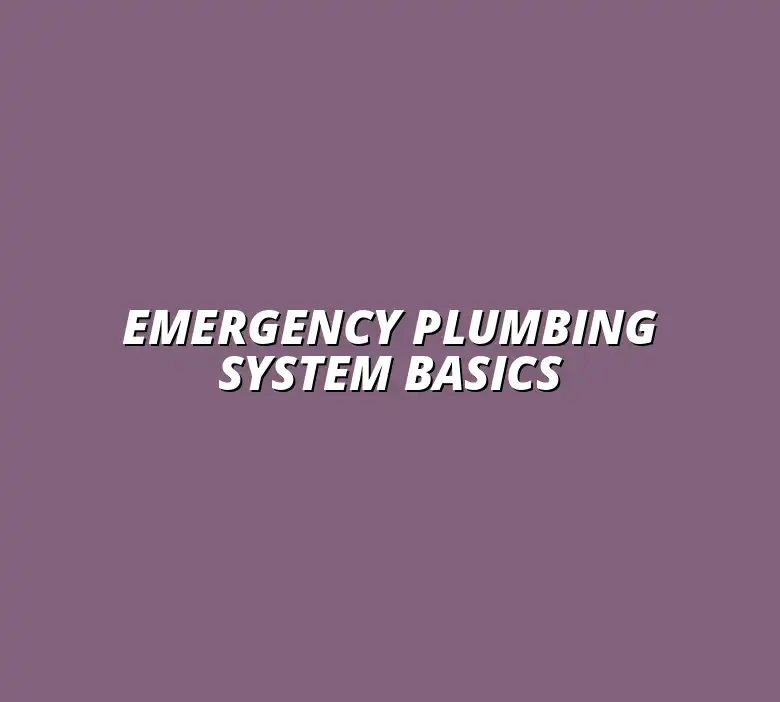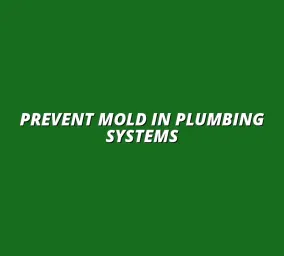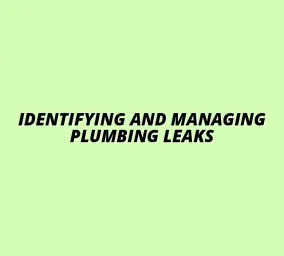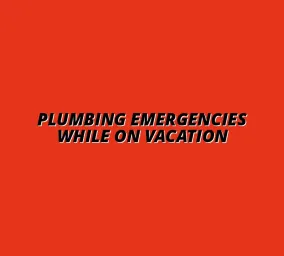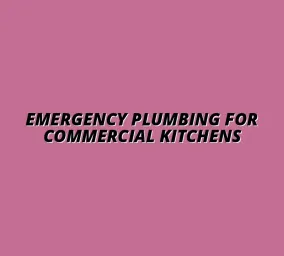Emergency Plumbing System Basics
Understanding Your Plumbing System in Emergency Situations
Being familiar with your plumbing system can make a big difference during emergencies. When a pipe bursts or a sink suddenly clogs, understanding how your system works can help you act quickly. In these moments, knowledge is power, and every second counts!
By knowing your plumbing layout, you can access shut-off valves or identify potential trouble spots. This can prevent minor issues from becoming significant headaches. So, let’s dive into why this familiarity is essential and what common plumbing problems can arise.
The Importance of Familiarity with Your Plumbing System
Why Knowing Your Plumbing System Matters in Emergencies
Having a grasp of your plumbing system becomes crucial during emergencies. If you’re in the middle of a water leak, knowing how to quickly locate the main water valve can save you from extensive damage. Additionally, understanding the layout allows you to guide repair professionals more effectively.
In the chaos of an emergency, you might panic. But if you’re prepared, you can reduce the stress and efficiently tackle the situation! Here are some reasons why this knowledge is vital:
- Quick Response: You can address issues faster when you're familiar with your system.
- Less Damage: Knowing where to shut off the water can minimize property damage.
- Cost-Effective: Timely interventions can save you money on repairs.
Common Plumbing Issues and Their Implications
Several plumbing issues can strike unexpectedly. From simple leaks to complete pipe bursts, each comes with its consequences. Recognizing these problems early can mean the difference between a minor fix and a costly repair job! For example, a slow-draining sink might seem insignificant, but it could indicate a larger underlying problem.
Here are some common plumbing problems you might encounter:
- Leaky Faucets: Can lead to water waste and higher bills.
- Clogged Drains: Often signal buildup that could worsen over time.
- Running Toilets: Waste precious water and increase expenses.
- Pipe Corrosion: Could cause leaks and affect water quality.
Essential Components of Your Plumbing System
Overview of Main Plumbing Parts
To understand plumbing emergencies better, it’s crucial to know the key components of your system. Your plumbing consists of various parts that work together to ensure water flows smoothly throughout your home. Here’s a quick overview:
- Pipes: Carry water to and from various fixtures.
- Fixtures: Include sinks, toilets, and showers.
- Valves: Control water flow and pressure.
- Water Heater: Provides hot water for bathing and cleaning. Regular water heater maintenance is crucial for preventing unexpected issues.
How Each Component Functions Together
Understanding how these components work together can help you troubleshoot issues. For instance, when you turn on a tap, water flows through the pipes, regulated by valves. If something goes wrong, knowing which part to check can save you time and frustration!
Here’s how these components interact:
- Pipes: Transport water from the main supply to fixtures.
- Valves: Manage the flow, helping to isolate problems.
- Fixtures: Receive water and allow you to use it as needed.
- Water Heater: Ensures hot water is readily available for use.
Recognizing Signs of Plumbing Emergencies
Common Indicators of Plumbing Problems
Knowing the signs of a plumbing emergency can help you address issues before they escalate. Some problems are more obvious than others, but being vigilant can prevent further damage. Here are some indicators to watch for:
- Unusual Sounds: Gurgling or hissing noises from pipes.
- Water Stains: Discoloration on walls or ceilings can indicate leaks. Regularly checking for hidden leaks, especially in bathrooms, can prevent costly damage.
- Low Water Pressure: A sudden drop may point to blockages.
- Bad Odors: Unpleasant smells can signal sewage backup.
How to Differentiate Between Minor Issues and Emergencies
Not all plumbing problems require immediate action. Learning to differentiate between minor issues and true emergencies is vital for effective management. For example, a slow drain might be annoying, but a burst pipe demands immediate attention!
Here’s how to categorize plumbing issues:
- Minor Issues: Dripping faucets, slow drains, or minor leaks.
- Emergencies: Burst pipes, sewage backups, or major leaks.
Immediate Steps to Take During a Plumbing Emergency
Shutting Off the Water Supply: A Step-by-Step Guide
When faced with a plumbing emergency, your first step is often to shut off the water supply. This can help prevent further damage while you assess the situation. Here’s a simple guide to follow:
- Locate the main water shut-off valve, usually found near the water meter.
- Turn the valve clockwise to stop water flow.
- Check all faucets to ensure the water is off.
- Gather information about the issue for when you call a plumber. Knowing how to repair a burst pipe quickly can limit damage.
Assessing the Situation: When to Call a Professional
After addressing the immediate leak, it’s time to assess whether you can handle the issue or need to call a professional. Some problems require expertise to fix safely and effectively. If you need urgent plumbing repairs, contacting a professional is essential. Here are some signs that you should reach out:
- Complex Issues: If the problem involves extensive damage.
- Safety Concerns: If there’s a risk of electric shock or flooding.
- Inexperience: If you're unsure how to proceed with repairs.
Tools and Equipment for Emergency Plumbing Repairs
Essential Tools Every Homeowner Should Have
Being prepared for plumbing emergencies means having the right tools on hand. You don’t need to be a plumbing expert, but some basic tools can make a difference during a crisis. Here are essential tools every homeowner should have:
- Plunger: Perfect for clearing clogged drains and toilets.
- Pipe Wrench: Essential for tightening or loosening pipes.
- Adjustable Pliers: Handy for gripping and turning various fittings.
- Bucket: Useful for catching leaks or excess water.
How to Use Basic Plumbing Tools Effectively During Repairs
Knowing how to use your plumbing tools can empower you to tackle minor issues confidently. For instance, using a plunger correctly can clear a clogged toilet or sink effectively! Here’s a quick guide on how to use some basic tools:
- Plunger: Ensure a tight seal over the drain and push down firmly before pulling up quickly.
- Pipe Wrench: Grip the pipe firmly; turn left to loosen and right to tighten.
- Adjustable Pliers: Use to hold nuts and bolts securely while turning.
With these tools and techniques in your kit, you’ll be ready to handle plumbing emergencies more effectively! Remember, a little preparation can go a long way in ensuring your plumbing system runs smoothly.
Preventive Measures to Avoid Plumbing Emergencies
Preventing plumbing emergencies is crucial for every homeowner. By taking the time to maintain your plumbing system, you can avoid costly repairs and keep your home safe from water damage. Regular check-ups and good habits can go a long way in ensuring everything runs smoothly. Maintaining your plumbing year-round is key to preventing major issues.
In this section, we’ll discuss common maintenance practices and bust some myths that might be leading you astray. You’ll also find answers to frequently asked questions about plumbing emergencies, which can be very helpful when you're in a jam!
Regular Maintenance Practices for a Healthy Plumbing System
Establishing a solid maintenance routine is the best way to keep your plumbing system in check. Having a plan will help you stay organized and proactive. Here are some practices you can incorporate into your routine:
- Inspect your pipes for leaks a couple of times a year.
- Clean your drains regularly to prevent clogs.
- Flush your water heater to remove sediment buildup.
- Check for signs of corrosion on exposed pipes.
Creating a plumbing maintenance schedule can also help you stay on top of these tasks. Aim for a mix of monthly, quarterly, and annual checks to cover all bases effectively. It's like a health check-up for your home’s plumbing!
Creating a Plumbing Maintenance Schedule
Your plumbing system deserves regular attention. By carefully planning out a maintenance schedule, you can avoid surprises down the road. Here’s a simple breakdown to help you get started:
- Monthly: Check for leaks and clean drains.
- Quarterly: Inspect toilet flappers and faucet aerators.
- Annually: Flush the water heater and inspect the entire plumbing system.
By sticking to this schedule, you can catch minor issues before they escalate into major headaches. Trust me, it’s much easier to fix a small leak than to deal with a flooded basement!
Identifying and Fixing Small Issues Before They Escalate
Understanding how to spot and address minor plumbing issues can save you both time and money. Common small problems include slow drains, minor leaks, and running toilets. Here’s how to tackle them:
- For slow drains, try using a plunger or a drain snake.
- Fix minor leaks by replacing washers or tightening connections.
- Running toilets can often be repaired by adjusting the float or replacing the flapper.
Taking a few minutes to fix these issues can prevent them from becoming bigger problems that require professional help. Plus, you’ll gain confidence in your plumbing skills!
Common Myths About Plumbing Systems and Emergency Repairs
There are many misconceptions surrounding plumbing systems that can lead to poor decisions. It's important to separate fact from fiction to ensure you’re making the best choices for your home. By debunking these myths, you’ll be better equipped to handle emergencies. Remember, addressing plumbing problems promptly can prevent them from turning into costly urgent plumbing repairs.
Let’s take a look at some of the most common myths and what you should really know about plumbing!
Debunking Misconceptions: What You Should Know
Some people believe that they can fix any plumbing problem with just a bit of elbow grease. Here are some myths that need busting:
- Myth: All plumbing issues can be fixed with DIY methods.
- Myth: You can pour anything down the drain as long as you flush it with water.
- Myth: Plumbing repairs are always a quick fix.
Understanding these myths will help you make informed decisions. Sometimes, it’s better to call a professional rather than risk causing more damage!
Understanding the Reality of DIY Emergency Repairs
While I appreciate the DIY spirit, it's important to know when to put the tools down and call for help. Many homeowners try to tackle plumbing emergencies themselves, but not all repairs are suited for a DIY approach. Here are a few guidelines to consider:
- Always assess the severity of the problem before attempting repairs.
- If you’re unsure, it’s wise to consult a professional plumber.
- Be cautious with sewer-related issues, as they can be hazardous.
When in doubt, prioritizing safety and long-term fixes is the way to go. There's no shame in calling for help!
Frequently Asked Questions About Plumbing Emergencies
It’s natural to have questions when it comes to handling plumbing emergencies. Below are some of the most common inquiries homeowners have regarding their plumbing systems.
Let’s dive into these frequently asked questions to help you stay prepared!
What Should I Do if My Pipes Freeze?
If you find yourself with frozen pipes, the first step is to turn off your main water supply. Then, follow these steps:
- Open faucets to relieve pressure.
- Gently warm the affected pipes using a hair dryer or heat lamp.
- Never use an open flame to thaw pipes, as this is dangerous!
Once thawed, check for leaks. If you notice any, it’s best to call a plumber right away!
How Can I Prevent Sewage Backups in My Home?
Sewage backups can be messy and stressful, but there are steps you can take to minimize the risk:
- Avoid flushing anything but toilet paper down the toilet.
- Schedule regular drain cleanings.
- Inspect your sewer lines for tree roots or blockages.
By taking these precautions, you can help keep your plumbing system running smoothly and avoid unpleasant surprises!
Final Thoughts on Plumbing Preparedness and Maintenance
Being proactive about plumbing care can save you a lot of grief down the line. By understanding your plumbing system and implementing regular maintenance routines, you’ll be equipped to handle emergencies efficiently. Remember, knowledge is power!
Let’s wrap it up with a few key takeaways that every homeowner should keep in mind.
Summarizing Key Takeaways for Homeowners
Here’s a quick recap of the most important points to remember:
- Establish a maintenance schedule to keep your plumbing system healthy.
- Don’t believe everything you hear about DIY repairs; know your limits.
- Stay informed about common plumbing issues to avoid potential emergencies.
By following these guidelines, you can ensure that your plumbing remains reliable and efficient!
Encouraging Proactive Approaches to Plumbing Care
Taking a proactive approach to plumbing care is essential for every homeowner. Whether it’s scheduling maintenance or learning more about your plumbing system, every little effort counts. And remember, when in doubt, don’t hesitate to ask questions or reach out to a professional.
With the right knowledge and tools, you can confidently handle any plumbing situation that comes your way. Happy plumbing!

